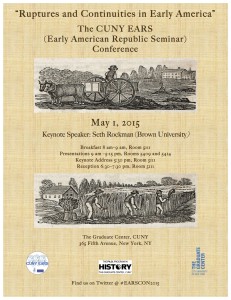For several years I have been a member of a student-run organization at the Graduate Center called the City University of New York Early American Republic Seminar, fondly abbreviated to CUNY EARS. This Friday, May 1st, is our graduate student conference, so first and foremost, my apologies for the unequivocal promotion. But if you are in or around New York City, you really should join us for what is sure to be a series of great conversations about United States history (cough cough, see the fancy flier to your left for details or visit our website).  While this might not be a teaching experience per say, there has certainly been a learning curve, particularly in how to structure a cohesive panel. It is not, I’m finding out, that dissimilar from structuring a coherent class. And while this is probably obvious to many, the palatable link between the professional service elements of our job, i.e. conference participation, and the benefits of teaching, has become very clear to me: teaching makes you a better historian in any professional sense.
While this might not be a teaching experience per say, there has certainly been a learning curve, particularly in how to structure a cohesive panel. It is not, I’m finding out, that dissimilar from structuring a coherent class. And while this is probably obvious to many, the palatable link between the professional service elements of our job, i.e. conference participation, and the benefits of teaching, has become very clear to me: teaching makes you a better historian in any professional sense.
Like other graduate student conferences I’ve attended, “Ruptures and Continuities in Early America”, or #EARSCON2015 for those that may want to follow on social media, flips the traditional dynamic of more senior scholars as chairs. Several EARS members will chair the panels, while a group of very generous, supportive faculty will offer comments to interdisciplinary participants from programs around the country. Barring any offensive or inappropriate conduct, which thankfully I have only observed once in several years, chairs peacefully moderate the discussion while commentators delve into the details. When giving a lecture, theoretically you are supposed to do more of the latter. But based on observations of student engagement, my lectures are consistently more successful when I draw on both roles: stimulating a conversation with substantial and provocative commentary and laying the groundwork for student/student debate.
This is the first conference I am participating in since I started fully running my own classroom. So one can only hope that consistently giving survey lectures over the past few months has improved my public speaking skills. I am curious though, if the times when I am NOT talking will also be improved by my classroom experience. When I first started my graduate teaching fellowship three years ago, I will freely admit that I was concerned with how to balance teaching responsibility with other “professional” and curriculum requirements: coursework, field and language exams, conferences, articles, fellowships, a dissertation. But in so many ways, teaching makes historians-in-training so much better at everything else outside the classroom: better speakers, better writers, better researchers. I am a better teacher because of my experience in the classroom, and my theory is that I will be better at chairing a panel because of it.
I have to go finalize my introductions for my panel now, so I will briefly conclude this promotional musing hybrid by asking that, if you would like to test my theory, attend our conference this Friday. You can absolutely feel free to tell me that I am an awful chair, but only if you show up and eat the terrific cheese display we have assembled.

